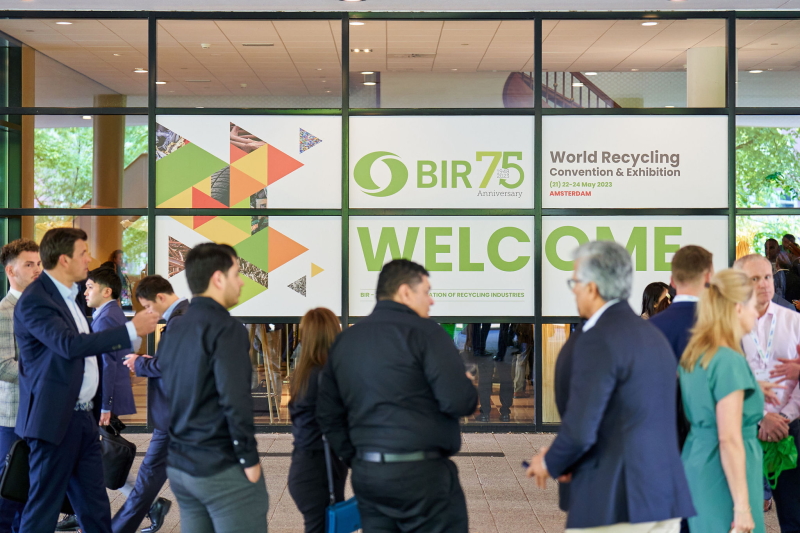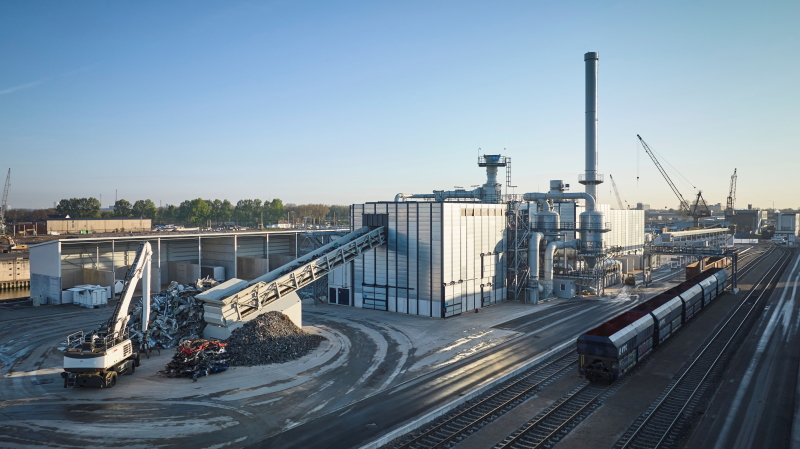
News
22 June 2023
A universal language for global recycling
Bureau of International Recycling celebrates 75th anniversary
The Bureau of International Recycling (BIR) celebrated its 75th anniversary at the end of May with a conference in Amsterdam. ‘No better place to celebrate the history and future of recycling’, says Andreas Krawczik, a member of the board of the Dutch Waste Management Association. ‘After all, the Netherlands is the birthplace of the BIR and a leader in developing high-quality recycling technologies. This was a great opportunity to showcase that.’
BIR represents the global recycling industry, with a membership consisting of 950 companies and 37 national associations from 70 countries. Andreas Krawczik, managing director of REMONDIS Nederland, attaches great importance to a universal language for the international recycling world. ‘We must learn to speak the same language if we are going to work well together. We vigorously promote the recovery of raw materials from waste. Without the raw materials we recover it would not be possible to keep the wheels of industry turning. To show the value of our activities we have to move away from using the term “secondary raw materials”, because it sounds like a second best option.’

The Bureau of International Recycling (BIR) celebrated its 75th anniversary at the end of May in Amsterdam.
Five times Wembley Stadium
A cleaner world begins with a common language and mutual understanding. ‘I’m pushing for a clear definition of circularity, because it has become a portmanteau concept which everyone can use to tell their own story. I see an important role for the BIR in forging a unified global whole.’ For much of the world recycling is still a remote possibility. ‘In Africa plastic is still burnt by the roadside in large quantities, simply because there is no waste collection infrastructure, not even to take it to a controlled landfill site. Every day around the world 1.6 million tonnes of municipal waste is dumped in the environment. This amount of waste is enough to fill Wembley Stadium five times over! A further 2 million tonnes is landfilled.’
Reducing carbon emissions
High-quality recycling considerably reduces global carbon emissions, because waste is reprocessed into raw materials. ‘As techniques improve we can recover ever larger amounts of raw materials and the purer the input, the higher the quality of the output. So it’s also about optimising the whole value chain.’ Of course, recycling is also a business and it creates jobs, but according to Krawczik there is an overlooked silver lining. ‘International trade and cooperation lead to political stability, not only because we all depend on each other, but also because we all have something to offer one other. It bridges social and cultural divisions.’
‘I see an important role for the BIR in forging a unified global whole.’
BIR’s World Recycling Convention in Amsterdam
The Bureau of International Recycling celebrated its 75th anniversary at an international conference at the end May. It was held in Amsterdam, the birthplace of the federation, and no fewer than 1,500 participants attended, representing 750 companies from 60 countries. Besides the anniversary, the convention focused on a modern, connected future in which international recycling takes centre stage in a circular economy. Susie Burrage of Recycled Products Ltd, the BIR’s first female president, took office during the convention.
The Dutch Waste Management Association, also a member of BIR, congratulates BIR on its anniversary.

Stop landfilling
But there is still much to be gained in Europe as well. ‘In southern and eastern Europe far too much waste is still going to landfill. Mountains of raw materials are being squandered and tonnes of CO2 are being lost. We have to get our act together in Europe before we can tell the rest of the world what to do.’ A bit of humility is needed for another reason, too, says Krawczik. ‘The idea that the strict regulations in the Western world are being circumvented by dumping waste in Africa is unfortunately not entirely unfounded. Waste is still being disposed of under the radar and we really must stop these illegal shipments.’

High-quality recycling considerably reduces global carbon emissions. Recyclers help companies to use recycled content.
Using recycled content
There is also plenty to do closer to home. ‘Most companies are already busy integrating recovered raw materials into their production processes, if nothing else because it makes them less vulnerable to shortages of primary raw materials caused by geopolitical tensions. Recyclers help companies to use recycled content. For example, TSR Recycling in Duisburg, a sister company of REDMONDIS, has developed an innovative production process for a high-quality certified recycling product for use in steelmaking that enables steel producers to reduce primary raw materials inputs. Carbon emissions are also reduced.’
‘International trade and cooperation lead to political stability.’
Better design
Krawczik sees opportunities in better product design where eco-design is not yet standard practice. ‘The major brands have to do more to design products so that at the end of their useful lives they can be dismantled and reused. That means not using thirty different types of plastic and gluing everything together inside impossible to open casings, because even with state-of-the-art recycling techniques nothing can be done with products like that. Cooperation is key here as well.’
Author
Harry van Dooren - @copyright
Translation
Derek Middleton
